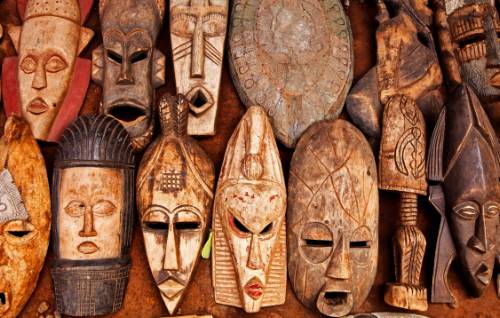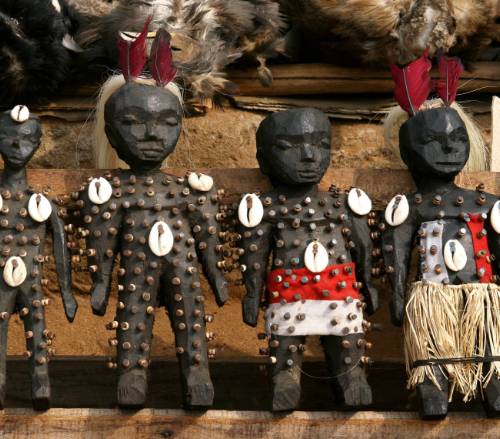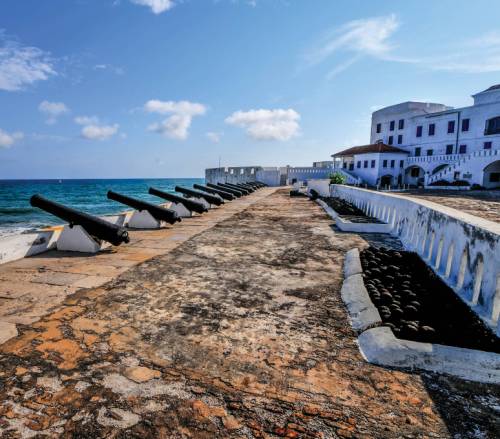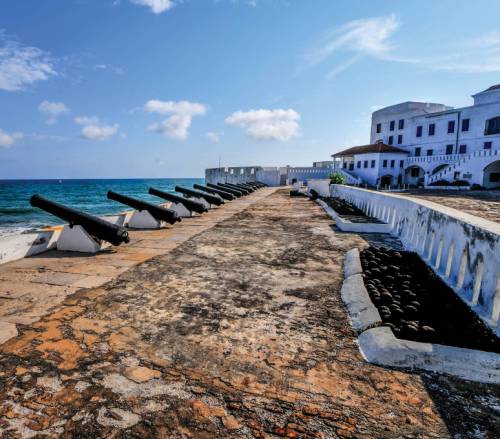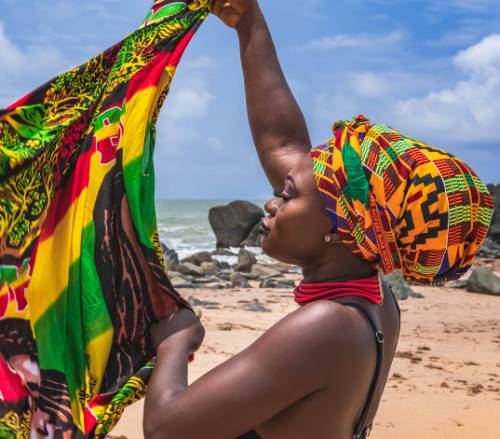Highlights of Ghana, Togo and Benin
Highlights of Ghana, Togo and Benin
$3620
Tour Overview
Embark on an unforgettable adventure through the vibrant cultures and landscapes of Ghana, Togo, and Benin. This 14-day tour offers a rich tapestry of experiences, from exploring the bustling streets of Accra to the tranquil stilted village of Ganvie. Discover the spiritual heart of Voodoo in Ouidah, hike to Togo's highest hilltop village on Mount Agou, and delve into the Afro-Brazilian heritage of Porto Novo. Cruise Lake Nokoue, visit the Royal Palaces of Abomey, and wander through Lomé's famous fetish market. With comfortable accommodations and private transport, this journey promises an immersive exploration of West Africa's diverse traditions and breathtaking scenery. ...more ...less
Highlights
Itinerary
Day 1 : Join Accra, Ghana
Location: Accra
Accommodation Name: Mahogany Lodge (or similar)
Akwabaa, Weezo (welcome) to Ghana. Your driver will meet you outside the arrival hall at Accra International Airport and take you to your accommodation. Remainder of the day is at your leisure.
Ghana’s capital Accra is a bustling metropolis and home to an interesting mix of old colonial neighbourhoods, crowded suburbs, fishing communities and spacious green affluent areas. Accra is a typical African capital city; urban planning can hardly keep up with the growing population. A lot of entrepreneurs try their luck in this overcrowded metropolis, and many of them find creative ways to make ends meet. It is the mix of the affluent elite with their fancy offices and street vendors in dusty alleys that give the city a distinct feel. Each area has its unique atmosphere, and it is the combination of all these opposites that makes Accra so impressive. Despite its size and busy traffic, Accra is an amicable, relatively hassle-free city and an inviting place to explore.
Overnight: Mahogany Lodge (or similar) ...more ...less
Day 2 : Walk in Shai Hills Resource Reserve
Location: Shai Hills Resource Reserve, Atimpoku
Accommodation Name: Afrikiko River Front Resort (or similar)
Meals Included: Breakfast
After breakfast, we drive (approx 1.5 hours) to Shai Hills Resource Reserve, a national park is characterized by coastal savannah vegetation, giant baobabs and mystifying rock formations dotted with caves. The park is home to native wildlife species such as Kob antelopes, bushbucks, colourful birds, olive baboons and green monkeys. And recently, they invited some other animal species such as ostriches and zebras. There are numerous beautiful trails of various difficulty levels centred around the ancestral caves, shrines and hills. There are caves with their gravestone rocks, tunnel-like openings and overhangs which were used and fiercely defended by the Shai kings until the end of the 19th century. We will undertake a 1-2 hours hike; or longer depending on the group fitness.
Afterwards we will visit a a local family-run glass beads factory and witness the century-old process of bead making from start to finish. Beads play a key role in Ghana culture and the tradition of bead making dates back centuries.
Then we will transfer to our hotel located in Atimpoku near the Volta River. Remainder of the afternoon is free at leisure to relax or take a canoe ride with a local fisherman (at your own cost).
Overnight: Afrikiko River Front Resort (or similar)
Driving: 85 km; 2 hrs
Day 3 : Amedzofe Canopy walk and Liati Wote
Location: Amedzofe, Ote Waterfalls, Liati Wote, Mt Afadjato
Accommodation Name: Tagbo Falls Lodge
Meals Included: Breakfast
After breakfast, we continue our journey through the green rolling hills in the Avatime Mountains. We make a stop at the picturesque hamlet of Amedzofe, Ghana's highest hilltop settlement, and enjoy the canopy walkway and the natural scenery of the Ote waterfalls. Amedzofe is one of the seven villages belonging to the Avatime Traditional Area, inhabited by the Guan people, the oldest tribe in Ghana, which contributes to the region's rich cultural heritage. Afterwards we drive to the rural village of Liate Wote, which is situated at the foot of Ghana’s highest peak Mt Afadjato. Get to know the community by going on a village tour where you meet the local people and witness the daily life. It's a purely rural community where life is centred around producing and processing farm products such as drying cocoa, cooking and milling maize. The guide will take you through the narrow backstreets and share the ancestors' history, local customs, and the latest community and eco-friendly initiatives.
Overnight: Tagbo Falls Lodge.
Driving: 150 km; 3 hrs
Day 4 : Liati Wote village; Mt Afadjato and Tagbo Falls hike (5 hrs)
Location: Liati Wote, Mount Afadjato, Tagbo Falls
Accommodation Name: Tagbo Falls Lodge
Meals Included: Breakfast
After breakfast, we will hike to Ghana's highest peak Mount Afadjato (2-3 hrs) and the Tagbo Falls (1.5-2 hrs). The hike to Mount Afadjato offers stunning views; on a clear day you can even see Volta Lake. The hike to Tagbo Falls is relatively easy through tropical farmlands and cocoa plantations. We walk alongside the meandering river and refresh at the pool.
This afternoon there is a choice of two activities - please advise the guide of your preference.
OPTION 1 - PALM TOUR
The Palm Tour shows you the tapping of fresh palm wine from a tree trunk and the home brewing of local gin called 'Akpetesi'. This fascinates many of our visitors. This local gin is popular throughout the country, and its production is a true industry in Ghana. In a simple but innovative way, the brewers manage to produce large quantities of this popular drink with very basic means.
OPTION 2 - ECO-FRIENDLY VILLAGE TOUR
Liati Wote is an eco-friendly community and has always been renowned for its commitment to cleanliness. However, the influx of tourism and the pervasive use of plastic posed a significant challenge to its environmental harmony. In response, a joint initiative was commenced in 2018, dedicated to fostering cleanliness and sustainability. Some of the outcomes of this initiative are the village streets adorned with waste bins and vibrant wall paintings, serving as educational tools for tourists and locals alike. The Green and Clean Hub comprises three distinct buildings: a workshop where skilled seamstresses craft beautiful products from recycled plastic, a charming shop named 'Nuku Arts' showcasing these eco-friendly creations alongside locally-made crafts, and an engaging awareness centre focused on environmental education and conservation. Visit the centre, try your hand at making your own, help us with compressing some plastic bottles or engage with the youth at the library and play games. Other options are learning about organic farming, or creating some art work with Khriz the artist who gives arts lessons (painting) inspired by nature.
Overnight: Tagbo Falls Lodge.
Walking: 5 hrs
Day 5 : Cross border to Kpalime, Togo and hike Mount Agou
Location: Kpalime, Mount Agou
Accommodation Name: Hotel Parc Residence (or similar)
Meals Included: Breakfast
After breakfast, we cross the border into Togo at Niyve near Ho from where you continue to Kpalime. We will hike up Mount Agou which is Togo’s highest summit at 986 metres. The traditional village of Agoutodji is perched on the rocky slope of the mountain and is the highest hilltop settlement in the country. The architecture is extraordinary and the views are absolutely breathtaking when the weather is clear. The trail to get there is a wonderful mix of natural beauty and cultural charm, and may give you an idea of daily rural life on the mountain. Return to Kpalime, which is a pretty town in Togo's green rolling hills.
The area around Kpalimé is known for its mountain range which offers some of the country's best scenery and hiking opportunities. It's the country's most fertile area, and you will find many cocoa and coffee plantations, fresh fruit and vegetables. The town of Kpalimé itself is a lively place with numerous drinking spots, nice restaurants, and a gorgeous craft centre. The afternoon is at leisure to enjoy the laidback atmosphere of Kpalimé town. There is a lovely pool and garden at the hotel. We also highly recommend a visit to the craft market.
Overnight: Hotel Parc Residence (or similar)
Driving: 70 km; 2 hrs
Walking: hrs
Day 6 : Hike Mount Klouto and Tomegbe Falls
Location: Mount Klouto, Tomegbe Falls
Accommodation Name: Hotel Parc Residence (or similar)
Meals Included: Breakfast
Enjoy a guided walk through the forest and farms around Kouma-Konda, a village near the top of Mount Klouto. During this botanical tour you can learn about all sorts of plants and trees and visit the nature conscious village that lies at its heart. The winding forest trails lead through an array of tropical vegetation like coffee plants and cocoa trees as well as various tropical fruit trees. The 2.5-3 hours forest hike leads to the coffee village of Kouma-Dunyo, where the people earn their livelihood from coffee farming and processing. Afterwards we take a popular short hike to Tomegbe Falls to enjoy some beautiful views and refreshments at the falls' basin, before heading back up to the hotel.
Overnight: Hotel Parc Residence (or similar)
Walking: 4 hrs
Day 7 : Cross border to Abomey, Benin
Location: Abomey
Accommodation Name: Chez Sabine (or similar)
Meals Included: Breakfast
Today we head to Benin through the border Tohoun-Aplahoue (visa is required). Please be aware that Benin has a different time zone. Our destination is Abomey, the capital of the ancient Dahomey Empire. Between 1695 and 1900, twelve kings ruled over the powerful empire of the Fon people. The empire played an essential role during the era of the slave trade; it derived its wealth by trading war prisoners as enslaved people with European merchants. The Kings were feared by other local powers as well as by the French colonisers; they were fearless warlords on a mission to expand their Kingdom. Your visit to the Royal Palace Museum will give you an insight into the evolution of the empire and the myths, customs and rituals of the Fon people.
Abomey is also known for its strong local culture, its mighty magic sorcerers and traditional ceremonies. The city takes great pride in its history and deliberately preserves its culture and traditions. Voodoo is recognised as the official religion of Benin but it really is more of a way of life here rather than a prescribed belief system, encompassing language, philosophy, music, art, dance and medicine. Many people still adhere to some of their ancestral ways – particularly in times of personal or community crisis. During your visit to Abomey, you will see many temples and shrines scattered throughout the city. It is possible to visit the authentic Abomey fetish market. This is not for the faint-hearted, though; fresh monkey and dog skulls (and their corresponding smells) are popular items here.
Overnight: Chez Sabine (or similar)
Driving: 183 km; 4.0-4.5 hrs
Day 8 : Sightseeing in the capital Porto Novo
Location: Abomey, Porto Novo, Black River
Accommodation Name: Residence Ouadada (or similar)
Meals Included: Breakfast
Before we leave Abomey, we visit the remarkable church (d'Adingnigon) built in the form of a chameleon. Afterwards the journey continues to the city of Porto Novo, a tranquil city with Afro-Brazilian heritage and Yoruba culture. The tranquil city of Porto Novo is the former capital of the French Dahomey colony, which existed in the first half of the 20th century. When the Portuguese established a slave-trading post in the 16th century, they named the city after Porto in their home country. Porto Novo is still the administrative capital of Benin, although much smaller and less fast-paced than nearby Cotonou. The history and culture that is somehow lacking in Benin’s largest city Cotonou, can be found in Porto Novo. Together with Ouidah, Porto Novo was one of the main ports of the trans-Atlantic slave trade, and many former slaves returned to their city after they were given their freedom. The Afro-Brazilian heritage is visible in the beautiful and colourful colonial buildings. There is also a vivid and powerful voodoo presence in Porto-Novo.
The Black River is one of the many rivers that flows into the southern Lac Noukoue and from there into the sea; plus the route that connects Benin to its neighbour Nigeria. Despite this, it's the most tranquil waterway of Benin. This is where you will find lushly vegetated riverbanks, fishermen peddling up and down the stream using traditional dug-out canoes and picturesque villages. The local people mainly belong to the Yoruba tribe. Their everyday life is centred around fishing, but they are also masters in palm wine tapping, woodcarving, and raffia for weaving and making instruments. All the crafts and items are displayed at the Adjara Market, and we will find out if the market is happening on the day (no fixed day).
Overnight: Residence Ouadada (or similar)
Driving: 160 km; 3-4 hrs
Day 9 : Porto Novo sightseeing
Location: Porto Novo, Brazilian-style Church, Ethnographic Museum, Le Jardin des Plants et de la Nature
Accommodation Name: Residence Ouadada (or similar)
Meals Included: Breakfast
Porto Novo's winding alleys, historical centre and inviting atmosphere allow great exploring by foot. The walking tour with a guide will focus on three neighbourhoods or themes; the traditional, Afro-Brazilian, and colonial. You will visit the beautiful and colourful colonial buildings, like the Brazilian-style church, which is a replica of the de Salvador de Bahia. The church is now used as a mosque. Porto Novo has taken it upon itself to renovate and preserve the historical places, such as temples, shrines and secret trees in various neighbourhoods in the city. Porto Novo is also home to many museums such as the Ethnographic Museum, and the Voodoo Museum (currently being constructed). End with a short visit and refreshment at Le Jardin des Plants et de la Nature, a beautiful cooling oasis in the city.
Overnight: Residence Ouadada (or similar)
Walking: 3 hrs
Day 10 : Visit Lake Nokoue and Ganvie stilted village and Ouidah
Location: Agodji, Lake Nokoue, Ganvie, Ouidah
Accommodation Name: Domaine de la Palmeraie (or similar)
Meals Included: Breakfast
We visit Agodji - an impressive Amazon sculpture and mural paintings. Agodji is a powerful symbol of empowerment and encouragement for women. This beautiful sculpture portrays a courageous female warrior standing tall and confident, symbolising the bravery of Amazon warriors from the past. The statue pays tribute to the cultural heritage of the Fon people and serves as a reminder of women's significant historical roles. It inspires both locals and visitors to appreciate women's contributions and advocate for gender equity. Enhance your visit by exploring the impressive, nearly 1.5-metre-long wall adorned with colourful mural paintings designed by various artists narrating Benin's history.
Afterwards we travel to the historical town of Ouidah, with a boat trip across Lake Nokoue to visit the amazing stilt village of Ganvie. Ganvié can only be reached by motorised canoe as it has been constructed on the open water of the lake. Roughly 40.000 people of the Tofinu tribe live in Ganvié, and it is one of the last remaining stilt villages, dating back some 400 years. At that time, the Tonifu people built these villages to escape Dahomey slave hunters who were banned from venturing into the water by religious customs. Fishing is the main activity of the Tonifu people and it is fascinating to experience daily life on the lake. From Ganvie we head to Ouidah on the coast.
Overnight: Domaine de la Palmeraie (or similar)
Driving: 81 km; 2 hrs
Day 11 : Exploring Ouidah, spiritual capital of voodoo
Location: Ouidah, Python Temple, Sacred Forest of Kpassé, Slave Route, Point of No Return Memorial, Museum of the Zinsou Foundation
Accommodation Name: Domaine de la Palmeraie (or similar)
Meals Included: Breakfast
For many people, Ouidah is the main reason to visit Benin. The town has a rich traditional and colonial history. In addition, as the capital city of the Atlantique department, Ouidah has an intriguing history of the trans-Atlantic slave trade. At the same time, the city is seen as Benin's spiritual capital. It offers a unique insight into the world of voodoo with its magical sites, temples and the annual Vodoun Festival. And ultimately, it is a beautiful place to relax and kick back at one of the beautiful palm-fringed beaches or enjoy the atmosphere and good food in one of the eateries.
We will visit the Python temple and sacred forest of Kpassé. Immerse yourself in African traditional beliefs at these interesting sites in the voodoo capital of Benin. The voodoo religion is deeply rooted in the country’s culture and traditions. It is not a belief system, but an entire way of life in which animals play an important part. We can visit the Python Temple, home to harmless python snakes, which are regarded as sacred and protected by the original people of Ouidah. At the Sacred Forest of Kpassé, you can hear great stories about the sacred trees. The forest houses many sculptures that symbolise voodoo, animist deities and beliefs.
Afterwards we explore the Slave Route, one of the historical highlights remembering the thought-provoking history of the Trans-Atlantic slave trade. The 3.5 km sandy road formed the final stage of the route before the slaves were shipped to the Americas. It leads from the historical slave auction square to the Point of No Return Memorial on Ouidah beach. It is incredible to imagine that the captives had reached this final part of their journey on the African continent, coming from as far up north as Mali and Burkina Faso on foot.
Zangbeto are the traditional voodoo guardians of the night in the voodoo religion of Benin and Togo. They are also referred to as the Nightwatchmen and act as an unofficial police force that protects the community against bad spirits and malicious people. The Zangbeto wanders around the streets to detect thieves and witches, and to provide law and order. Zangbetos are highly respected by the community, and it is truly fascinating to see them perform, and to surrender to the magic of their performance will be absolutely rewarding.
Finally, the Museum of the Zinsou Foundation offers changing exhibitions in a beautiful colonial Brazilian house and is definitely worth a visit for contemporary art lovers. The modern art on display here is based on several relevant local themes.
Overnight: Domaine de la Palmeraie (or similar)
Day 12 : Cross border to Lome, capital of Togo
Location: Mono River, Les Bouches du Roi, Lome, Le Marché des Fetisheurs
Accommodation Name: Robinson Plage (or similar)
Meals Included: Breakfast
Today we continue our journey along the Slave Coast into Togo, an extremely narrow nation wedged between Benin and Ghana. A former protectorate of Germany, Togoland was seized by British and French forces at the start of WW1. It gained independence in 1960.
We hop on a pirogue and drift along the Mono River with its banks full of sand dunes and palm trees. The river has its source in northern Togo and stretches all the way to southern Benin. The most southern part forms the natural border between the two countries. At only a short distance from Grand Popo, you can enjoy a leisurely boat cruise, while keeping an eye out for marine birds hovering over the mangroves. The sweet water from the Mono River and the salt water of the Gulf of Guinea meets at the ‘Les Bouches du Roi’ (Mouth of the King). Meandering this amazing area by pirogue is a unique opportunity to enjoy the lovely nature in all its beauty. The cult of voodoo is very strong in this water-rich area. It is possible to stop at small fishing villages along the way, where you can meet traditional fishing communities and find religious shrines.
We then travel to the capital, Lome, which which offers a mix of urban sophistication and rural informality, Lomé oozes a certain nonchalance that is quite unique among West African capitals. Lomé is a great place to have fun and enjoy a café-au-lait or cold beer in one of the pleasant roadside ‘maquis’ or bars, or visit some of the arts and textile galleries.
Experience Lomé’s famous ‘Le Marché des Fetisheurs" - the largest Fetish market in all of West Africa. The Fon people from Benin established ‘Le Marché des Fetisheurs’ or Akodessa. Here you will find many mystifying items on display. This is where the local people purchase animal skins, bones and skulls to prepare for their traditional ceremonies.
Overnight: Robinson Plage (or similar)
Driving: 112 km; 2.5-3 hrs
Day 13 : Lome sightseeing
Location: Davedi, Le Palais de Lomé, Le Musée International d'Art d'Afrique
Accommodation Name: Robinson Plage (or similar)
Meals Included: Breakfast
Today, we have our final rural experience with a twin doll ceremony in Davedi and close the day with a museum visit.
A visit to the small rural town of Davedi will allow you to experience traditional Ewe culture in southern Togo. The area is known for its vast pineapple and palm plantations. Explore the community and surrounding farmland on foot and experience how people process palm nuts into palm wine and gin. Spend some time with the women and learn about their wooden twin dolls, a century-old ceremony performed by the older generation. When one of the twins dies, the family needs to replace the deceased with a wooden carved doll and cater for it as a real person, including bathing, dressing, feeding, etc. This is done to protect the other twin from following the diseased. It is fascinating to experience this daily activity. Complete your experience by enjoying a local dish like Akple with Okro and 'Poulet Bicyclette’.
Discover the Historical and Contemporary Arts from West Africa at Le Palais de Lomé. This 120-year-old building was once the closed and forbidden residence of the German Governor, changed hands to the French colonial powers and became property of the Togolese government. Today, the building has been beautifully renovated and opened to the public sharing the diversity of national and pan-African culture and arts. The building is surrounded by a unique botanical garden. It’s also worth it to stop by Le Musée International d'Art d'Afrique which comprises a private collection of historical artefacts from all over West Africa. On display, you will find mainly masques and statues that are used at festivals and traditional ceremonies.
Overnight: Robinson Plage (or similar)
Day 14 : Cross border and transfer to Accra, Ghana where trip concludes
Location: Accra
Meals Included: Breakfast
Today we cross the border into Ghana, and continue to Accra where you can undertake some last minute souvenir shopping before your transfer to the airport, where the trip concludes.
What's Included
-
Private vehicle transport
Travel comfortably with private vehicle transport throughout the tour, including airport transfers on days 1 and 14.
-
Boat transfer on Lake Nokoue
Enjoy a boat transfer on Lake Nokoue as part of the tour.
-
English speaking local driver-guide
Benefit from the services of an English speaking local driver-guide throughout the tour.
What's Not Included
-
International flights & taxes
-
Additional airport transfers (other than Days 1 & 14)
-
Meals and beverages not listed in the itinerary
-
Bottled water, aerated and alcoholic beverages
-
Items of a personal nature such as phone calls, internet, laundry, souvenirs, etc.
-
Travel Insurance
-
Visas
-
Tips
-
Additional excursions and activities not listed in the itinerary
Mode of Transport
Travel comfortably with private vehicle transport throughout the tour, including airport transfers on days 1 and 14, and a boat transfer on Lake Nokoue.Accommodation
Enjoy 13 nights in 3-star or best available hotels on a twin-share basis, including stays at Mahogany Lodge, Afrikiko River Front Resort, Tagbo Falls Lodge, Hotel Parc Residence, Chez Sabine, Residence Ouadada, Domaine de la Palmeraie, and Robinson Plage.What You Carry
In your daypack you will need to carry extra warm clothing (depending on the location and weather), a rainjacket, water bottle, camera gear, valuables and personal items such as sunscreen, lip balm etc.Grading
Although there is no commitment to extended walking on this journey we nonetheless want to keep the ‘accent on the active’. We therefore advise that any physical training you complete before undertaking the trip will be to good effect. There is no shortage of advantages of packing as much into your time as possible. The fitter you are the more this will enhance your experience.Check out our Q&As
-
What type of transportation is used during the tour?
The tour includes private vehicle transport throughout, including airport transfers on days 1 and 14, and a boat transfer on Lake Nokoue.
-
What kind of accommodation can I expect on this tour?
You will enjoy 13 nights in 3-star or best available hotels on a twin-share basis, including stays at Mahogany Lodge, Afrikiko River Front Resort, Tagbo Falls Lodge, Hotel Parc Residence, Chez Sabine, Residence Ouadada, Domaine de la Palmeraie, and Robinson Plage.
-
Are meals included in the tour package?
The tour includes 13 breakfasts and 2 dinners. Meals and beverages not listed in the itinerary are not included.
-
Is there a guide provided during the tour?
Yes, an English-speaking local driver-guide is included in the tour.
-
What activities are included in the tour itinerary?
The tour includes various activities such as hiking in Shai Hills Resource Reserve, visiting a local glass beads factory, exploring the Amedzofe canopy walk, hiking Mount Afadjato and Tagbo Falls, visiting the Royal Palace Museum in Abomey, sightseeing in Porto Novo, a boat trip to Ganvie stilt village, and exploring the spiritual capital of Voodoo in Ouidah. ...more ...less
-
What cultural experiences are part of the tour?
Cultural experiences include visiting the Royal Palaces of Abomey, exploring the Afro-Brazilian heritage in Porto Novo, experiencing the voodoo culture in Ouidah, and visiting the largest fetish market in West Africa in Lomé.
-
Who will be my travelling companions on the tour?
We have offices on three continents which means your travelling companions will be just that – international and wonderfully eclectic. Part of small group travel means that although travellers come from various locations and backgrounds, you will be travelling with like-minded companions who, like you, are keen to share the experience and forge lifelong friendships.
-
What about environmental impact?
We believe that adventure travel revolves around establishing a strong relationship with the people and environments in which we operate. Our responsible travel policies have been carefully developed to ensure that we minimise the impact of our presence and help to protect the regions we visit while contributing positively to the local community.
-
What should I pack?
Your pre-departure documents include a detailed packing list with items that you need to bring. While most of the equipment for daily activities is included in your tour cost, some items like helmets and hiking boots are best brought from home. The pre-departure documents also include information on layering and recommended brands for various items to ensure you are fully prepared for your trip.
-
Do you operate a “single share” option and how does it work?
Yes. World Expeditions does not require single travellers to pay a surcharge for travelling alone on the vast majority of our trips. Our holidays are primarily on a twin share basis, so if you are joining the group as a solo traveller, we will match you with someone of your own gender. The choice is yours however; if you prefer not to share, we do offer single supplements for private occupancy.
-
Are tips included in my trip price?
Tips are not included in the tour cost. Tipping is a personal thing, do not worry about how much, or when, to tip. Tipping guidelines are provided for certain destinations in our pre departure information upon booking, however the best advice will be provided by your tour leader.
-
Am I suited to small-group travel?
We recognise that many of our travellers have not been on a ‘group trip’ before. Yet what our departures provide is both structure and flexibility, allowing you plenty of freedom within the framework of the itinerary. You’ll find that with our maximum group size at 16, you’ll travel in a minimal impact style with a great group of like-minded travellers.
-
Can you advise which vaccinations are recommended?
While our pre-departure kit provides information on vaccinations, we suggest that you consult your doctor, local government inoculation centre or a travel medical specialist in order to get the most current advice regarding vaccination requirements.
Reviews of this operator
1 Select your preferred date
Book with Confidence
-
Transfer as credit for future tours
World Expeditions allows you to transfer existing payments to a future tour to avoid cancellation fees if you can't travel and inform world expeditions, 70 days before departure.
-
Low Deposit
World Expeditions requires a minimum deposit of 400 GBP per person or the full booking value, whichever is less, with the final balance not due until 70 days before departure.
-
Cancellation Policy
We don't charge a cancellation fee, here is a summary of world expeditions charges.
Up to 70 days before tour starts: Forfeit 100% of deposit.
At 69 days before tour starts: Forfeit 50% of booking price.
At 35 days before tour starts: Forfeit 100% of booking price.
Highlights of Ghana, Togo and Benin
14 Days Starting and ending in Accra, Ghana
Visiting: Accra, Shai Hills Resource Reserve, Atimpoku, Amedzofe, Ote Waterfalls, Liati Wote, Mt Afadjato, Mount Afadjato, Tagbo Falls, Kpalime, Mount Agou, Mount Klouto, Tomegbe Falls, Abomey, Porto Novo, Black River, Brazilian-style Church, Ethnographic Museum, Le Jardin des Plants et de la Nature, Agodji, Lake Nokoue, Ganvie, Ouidah, Python Temple, Sacred Forest of Kpassé, Slave Route, Point of No Return Memorial, Museum of the Zinsou Foundation, Mono River, Les Bouches du Roi, Lome, Le Marché des Fetisheurs, Davedi, Le Palais de Lomé, Le Musée International d'Art d'Afrique ...more ...less
Tour operator:
Tour code:
GTB
Guide Type:
Fully Guided
Group size:
6 - 16
